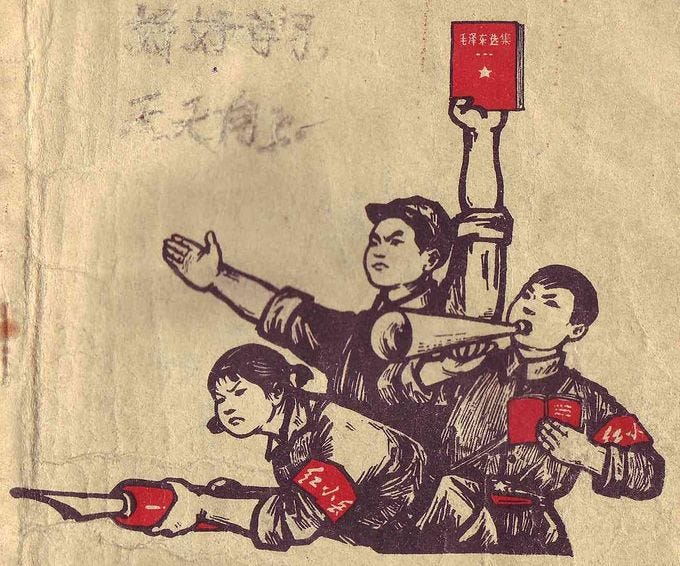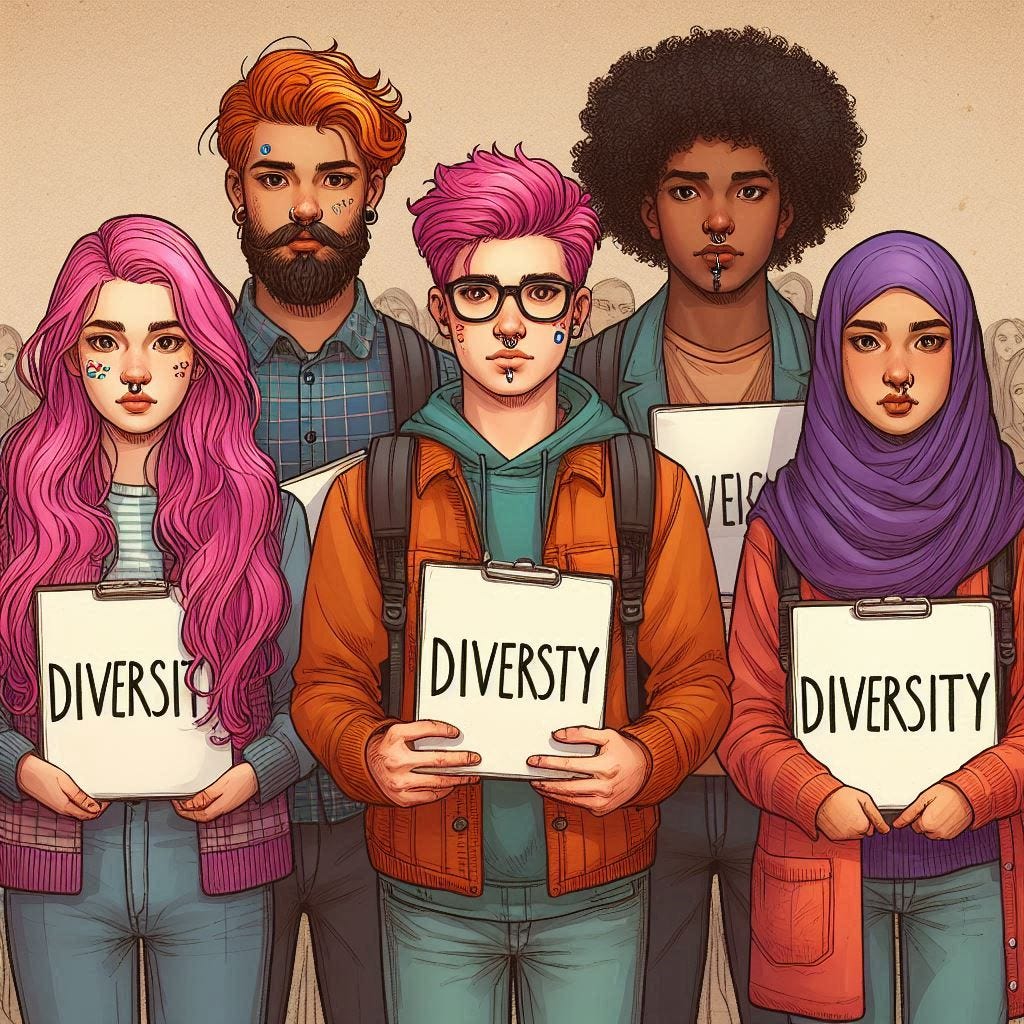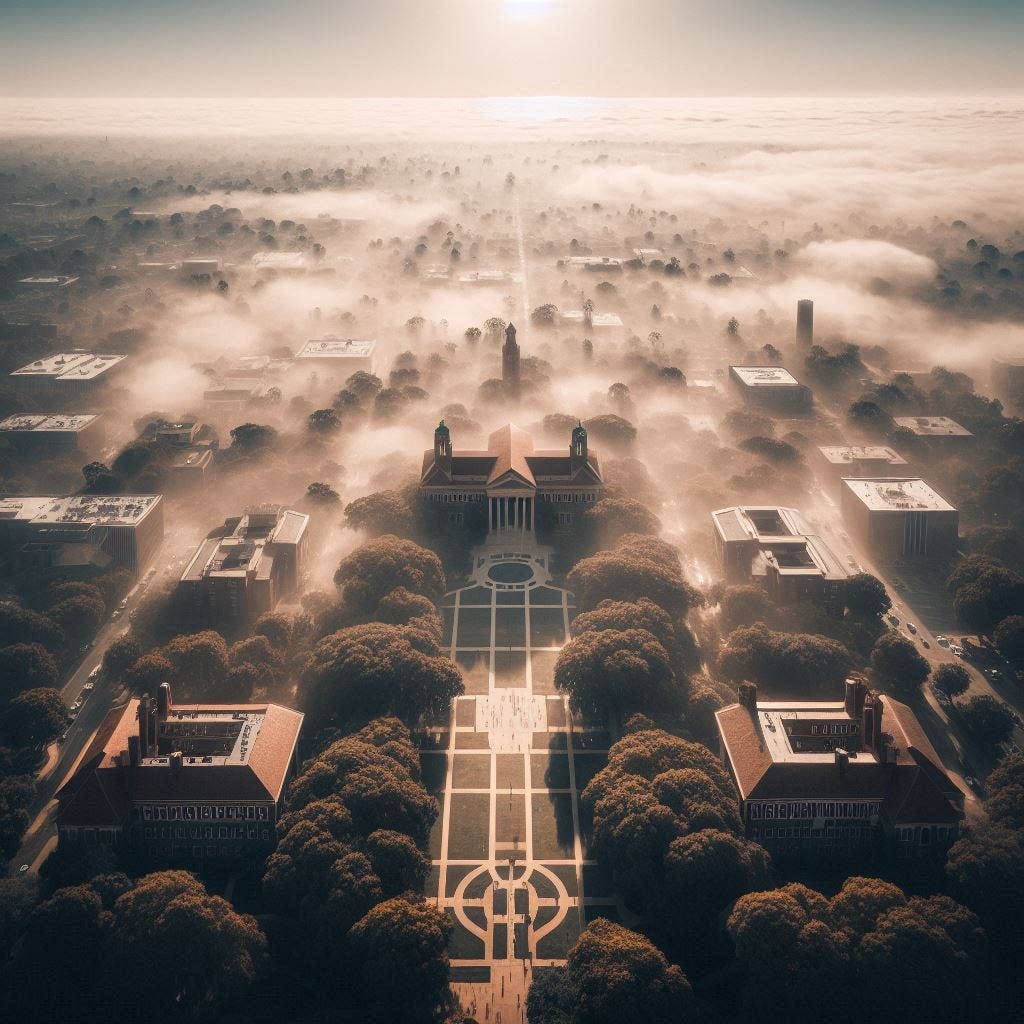Forgive the Student Protesters
They are tragic pawns in today’s culture war
To authoritarians, the young are merely instruments.
History demonstrates it. Possessed by narcissism, they look to reshape the world in their image. Extremists of all creeds display an eagerness to get the next generation involved.
They typically appoint adolescents to carry out the mission.
Mao Zedong relied on student radicals doing his dirty work, the importance of which he stressed:
“We need determined people who are young, have little education, a firm attitude, and the political experience to take over the work…”
Adolf Hitler is recorded to have said:
“If only we can succeed in inculcating […] above all into the German youth, both a fanatical team spirit and a fanatical devotion to the Reich, then [it] will once again become the most powerful State in Europe […]”
Vladimir Lenin had a different ideology, but similar fantasies:
“…We need that generation of young people who began to reach political maturity in the midst of a […] struggle against the bourgeoisie. In this struggle that generation is training genuine Communists.”
In truth, all three were vampirical to the young.
They used them as foot soldiers, only to duly sacrifice them:
Once no longer useful, Mao banished his Red Guards to the countryside under the guise of reeducation. Hitler would use the graduates of his Hitlerjugend to feed the Nazi war machine. And Lenin praised his Komsomol, but readily let other kids starve.
The skirmishes of the modern West are cultural.
Instead of paying with their blood, student radicals now bleed dry their reputations. The average free citizen empathizes with the Palestinians, but is shocked by calls for “global intifada”. Infringing upon others’ rights by beleaguering shared spaces does not help either.
Through their extremism, they alienate the public.
They do not see that they are hurting their cause. Few of us disagree that innocent lives should be saved abroad, but breaking the law at home crosses a certain line. It demonstrates a blatant disrespect for authority.
To make matters worse, they have allied themselves with revolutionary thugs.
One might wonder what has gotten into them. Ivy League students are steering down quasi-criminal paths. Those held to someday lead institutions, appear hellbent on subverting them.
Since Generation Z (or: the Zoomers) are at the forefront of the movement, they appear to be its driving force.
Nothing could be further from the truth. The extremism cultivated within them is an offshoot of power ideology: a philosophical trend that has plagued Western universities since the philosopher Friedrich Nietzsche and is now on full display. The students are ordinary marionettes.
Many were taught to view the world through so-called “critical” theory (CT).
The doctrine of CT claims society to be unjust by definition. As Max Horkheimer, one of its founders, put it: Traditional social scientists describe institutions as they are, but critical theorists attempt to expose them as unjust, undermining their legitimacy.
This approach is grim and seldom useful.
Wherever injustices exist, CT may help shed light on them. But those who view the world through the lens of power, usually refuse to see it any other way. In other words: to the quasi-Marxist hammer, everything looks like a nail of oppression.
In critical theory, power is the only variable.
It is a peculiar assumption that leaves no room for goodwill, generosity, or even altruism. But, its impetus is not scientific; it is psychological. There is an addictive quality to moral outrage. Asserting oneself to be the underdog in a world of injustice, allows one to play a messianic hero. It is a sophisticated way to veil true resentment in false compassion.
This infantile attitude serves no justice to the complexities of the world.
The Israelis and the Palestinians, for example, contain humane as well as corrupt individuals – like all peoples do. Defining either as categorically good or evil will inevitably miss the mark. Since no government policy enjoys unanimous support from its citizenry, one cannot reasonably demonize an entire people for the actions of a state.
Unfortunately, such collective discrimination is precisely what CT propagates.
Therefore, it is still happening.
Since October 7th, antisemitic incidents in the US have starkly increased. The same goes for its college campuses. Anecdotes by Jewish students at its top universities demonstrate clear ethnic contempt for them.

Somehow, the lesson remains unlearned.
CT’s group-based outlook (particularly intersectionality) is at the root of the phenomenon.
It tells students they should define themselves and each other by traits such as race. Since Israel is regarded as a powerful state, and the Jews as a powerful race, both are considered oppressors. Anti-semitism is therefore framed as allyship: a noble way of punching up.
Antipathy towards Jews naturally follows from – and can even be justified through – the ideology.
It is distinct from the social Darwinism of the far-right but bears the same results: CT marks certain groups as morally inferior due to their immutable characteristics. Neo-Nazis base their essentialist doctrine on fallacious biology; critical theorists do the same, but use oversimplified sociology instead.
Both reduce individuals to their group identity and overlook the complexity of the human condition.
Such collectivism tragically affects the student activists themselves. Instead of cherishing their individualism (their unique attributes), they form mindless mobs. They betray the purpose of academic life: personal growth.
The universities have provided this trap.
They consist broadly of four groups: ideologues who indoctrinate students, administrators who facilitate it, colleagues who let it happen, and marginalized colleagues who protest. Although the students reserve the excuse of being young and oblivious; the faculty does not. They should hold themselves responsible.
If anyone caused the anti-semitism engulfing the West, it is the proliferators of CT – not just its henchmen and -women.
CT’s criticism is, in truth, cynicism. It insists that human motivations are solely nefarious: solely motivated by power. That is incorrect, but it is correct that people act by their beliefs. Hence, the average critical theorist behaves like a Machiavellian. This does not lead to students’ empowerment, but their exploitation.
The will to power, as coined by Nietzsche, possesses their philosophical minds and therefore, their human hearts.
The Swiss psychiatrist Carl G. Jung pinpointed an antidote to this pathology half a century ago:
“Where love reigns, there is no will to power and where power predominates, love is lacking. One is but the shadow of the other.”
In CT, in modern universities, and in campus activism, love has demonstrated itself to be lacking.
Their ideology is founded not on love, but on power. Their protests are less informed by an affection for the Palestinians than by hatred for Israel. Their “intifada” is less informed by sympathy toward the downtrodden than by resentment toward the oppressors.
It is not the young who chiefly peddle the poison; they are merely its fresh faces.
The true starters of the mayhem avoid the cameras. Professors provide adolescents with full degrees in the art of self-righteousness. Once their savior complexes are induced, all that is left to do is watch them set the world on fire. Faculty shuns the limelight but applauds the theater.
God forbid they endanger their own livelihood.
For revolutionaries, far-left academics are mundanely careerist. Critical theorists will call for a dismantling of power right up to the point where it jeopardizes their own. Once the minions enforce it, the masters are nowhere to be seen (or avoid arrests as “non-participant observers.”)
It is left to militant Zoomers to realize an “intifada” on Western soil.
This homework assignment will prove to be in vain. When they fail, some will grow disenchanted and see their ideology for what it is: laughably vacant. Some will double down.
All, however, will suffer the consequences.
Since these protests cannot age well, their reputations will suffer. Since self-aggrandizement is poison to the mind, their psychology will suffer. And since they have steered down questionable paths, their lives will suffer.
Still, the intellectuals who set them up may once again slip through, using excuses:
“We do not condone violence (although “intifada” by definition requires political revolution.)”
“We were exercising free speech (although we think of free speech as an oppression mechanism.)”
“CT is just another lens to view the world through (although the term “woke” implies anyone who does not to be asleep.)”
Over the past decades, they cast an illiberal mist so thick that none on campus could help but breathe in the toxins. Blaming their spread on the students is ridiculous. The ideology predates them by over sixty years.
It is fundamentally not a Zoomer, but a Boomer phenomenon.
Generation Z should realize they have been used. Currently, they are pimping themselves out as power tools to delusional utopians. But, humans – especially young ones – are destined for greater things.
In 2024, “woke” might earn a new meaning: waking up to the hollowness of critical theory.










"The students are ordinary marionettes."
This is true no more so than in their parroting anti-Zionist and antisemetic Soviet propaganda and KGB talking points. Yet, how many of them have even heard of the Soviet Union or the KGB?
Exactly who was it that won the Cold War?